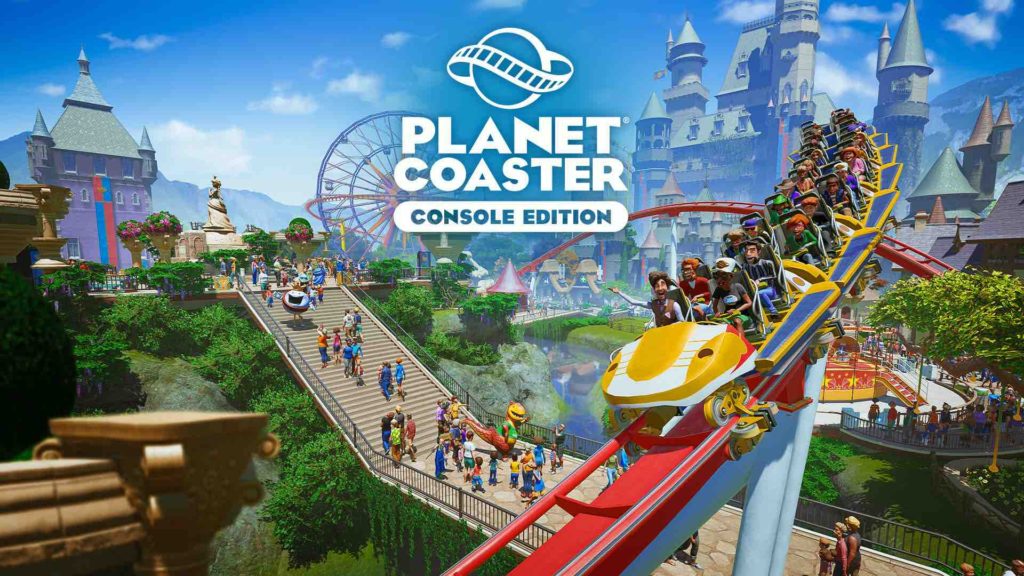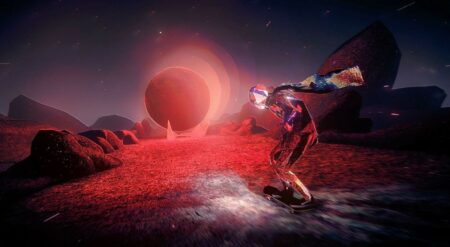
When I was a kid, I used to come home from elementary school, throw my backpack on the floor and immediately head into the computer room with my friends, staring at the screen as we sat building rollercoasters in RollerCoaster Tycoon almost every day. I’ve chased that high ever since, all the way to the Planet Coaster PlayStation 5 edition.
As someone who primarily prefers consoles to PC, it’s been hard to find a competent construction and management simulator that translates well to a controller. Planet Coaster, developed and published by Frontier Developments, pulls off the transition seamlessly, offering a fun, approachable, and gorgeous simulation experience.
Planet Coaster offers three modes: Career, Sandbox, and Challenge. Career Mode is a loose story mode. There are four primary characters, each offering you advice on a different aspect of the park—general help, financial, coaster building, and guest attraction. Throughout Career Mode, you’re given goals to hit, usually objectives such as getting a certain number of guests in the park or hitting a financial milestone.
Sandbox Mode, on the other hand, is free play. You’re able to mess around and build anything you want, thoroughly exploring the options without any goals to meet. Challenge Mode is like Sandbox Mode, only your resources are finite and not unlimited like they are in Sandbox Mode.

Each mode is good and worthwhile; which you will spend more time playing is just dependant on what you’re looking for in your simulation games. Personally, I love checking off boxes and getting that serotonin rush of completing objectives, so I spent most of my time in Career Mode.
The Career Mode in Planet Coaster also serves as a tutorial for Sandbox Mode, teaching you the ropes and how to better your park. I easily get overwhelmed in simulators, depending on how they’re set up, but Planet Coaster does a fantastic job of walking you through an in-depth tutorial so that once you get to the more complex tasks, you know what you’re supposed to do, even if it’s hard to achieve.
Additionally, Planet Coaster was a delight because it’s the first time I felt like a complicated simulation game ran well on a console. I never struggled with the controls, which was a refreshing experience. The game runs and controls smoothly, allowing me to build a park just as efficiently as I could with a mouse and keyboard on PC. The camera, for example, which is what I usually struggle with when playing simulation games on consoles, was easy to control. I was able to zoom in enough to place and edit things when I needed to, but I also had no issue zooming out to see the park as a whole. Rotating the camera never gave me any glitches or weird, unfixable angles that ruined my ability to accurately create paths, buildings, and rides.
Having buttons the buttons I needed to press for certain actions displayed on-screen made Planet Coaster easy to navigate as well, creating shortcuts for quick use. For example, to speed up time, I simply had to press square and up on the D-pad. Once I had memorized the basic button combinations that I wanted to use frequently, controlling my park how I wanted to became a breeze.
Planet Coaster looks beautiful, too. It relies on a slightly cartoony art style, but still feels like an authentic, realistic amusement park. Everything is sleek and blends well together.
My biggest fear when I started up Planet Coaster, other than the controls in general, was what the rollercoaster building system would be like. Much to my relief, it’s relatively painless and easy to do, even if you’re not a genius. The triggers let you easily switch between types of tracks you want to lay down, and the effective camera helps zoom in and out when necessary to be more accurate.
Building “good” rollercoasters has never been my strong suit in simulation games, especially in more complicated scenarios. However, Planet Coaster does a great job making the process approachable for people like me who aren’t quite as good at physics. or thinking things through before placing them on the map. There are a variety of customization options and ways of discerning whether guests will like your coaster or not for players wanting a more in-depth experience, but it’s also pretty simple to just snap piece together like a virtual LEGO rollercoaster.
Overall, Planet Coaster was a pleasant surprise, making the transition from PC to PlayStation 5 seamlessly. The control scheme is, by far, the most efficient and easy to use experience I’ve ever had with a controller in a simulation game. Everything about the game looks sleek and shiny, making your parks pleasant to look at and fun to build. Along with that, the customization options, like build-your-own rollercoasters and scenery or pre-made models, allow players to essentially pick their difficulty level, offering complex and simple solutions depending on the player’s preference. Planet Coaster is my new addiction, joining RollerCoaster Tycoon as one of my favorite simulation games.
Planet Coaster is available now on PC, PlayStation 4, PlayStation 5, Xbox One, and Xbox Series X|S.
Planet Coaster - PlayStation 5 Edition
-
Rating - 8/108/10
TL;DR
Planet Coaster was a pleasant surprise, making the transition from PC to PlayStation 5 seamlessly. The control scheme is, by far, the most efficient and easy to use experience I’ve ever had with a controller in a simulation game. Everything about the game looks sleek and shiny, making your parks pleasant to look at and fun to build. Along with that, the customization options, like build-your-own rollercoasters and scenery or pre-made models, allow players to essentially pick their difficulty level, offering complex and simple solutions depending on the player’s preference. Planet Coaster is my new addiction, joining RollerCoaster Tycoon as one of my favorite simulation games.






